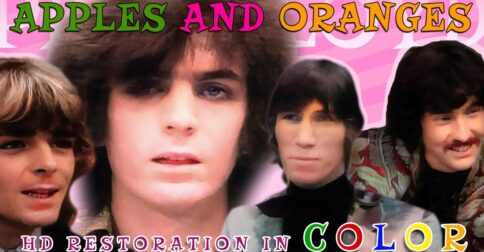
Several years ago, Josh Jones took you inside Pink Floyd’s first appearance on American television. In 1967, after releasing their first album Piper at the Gates of Dawn, the band came to the States and made their unlikely TV debut on Dick Clark’s American Bandstand, performing “Apples and Oranges.” That’s the “third single and the final song Barrett wrote for the band before he suffered a psychotic break onstage and was replaced by David Gilmour.”
Our original post featured grainy black and white footage of the appearance. Above, you can watch a restored, colorized version that took nearly a year to create. According to the YouTube channel “Artist on the Border,” each “frame of the 3350 required frames had to be uploaded individually, downloaded again and individually named.” Enjoy the fruits of their labor above.
If you would like to sign up for Open Culture’s free email newsletter, please find it here.
If you would like to support the mission of Open Culture, consider making a donation to our site. It’s hard to rely 100% on ads, and your contributions will help us continue providing the best free cultural and educational materials to learners everywhere. You can contribute through PayPal, Patreon, Venmo (@openculture) and Crypto. Thanks!
Related Content
Pink Floyd Performs on US Television for the First Time: American Bandstand, 1967
Talking Heads’ First TV Appearance Was on American Bandstand, and It Was a Little Awkward (1979)
from Open Culture https://ift.tt/fJeOlxb
via Ilumina
Comments
Post a Comment